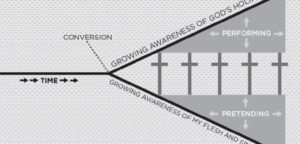“Copy these articles and get them to the client by the end of the week.” says your supervisor.
But you both know that the articles were copyrighted by a direct competitor.
To copy them would be wrong (they aren’t your company’s intellectual property), but to quit your job over a foolish demand feels wrong, too. You’ve invested years of your life in this place to try and make a difference—and you need the income.
What do you do when you’re asked to participate in something morally wrong at work?
Most Christians generally respond in two ways, but I’d like to suggest a third.
Pretending
This first response gives in to expectations and demands that are sinful, immoral, unwise, or unlawful, either because of an uncritical acceptance of workplace values or an indifference to doing wrong.
Sometimes this response is rationalized by distorting the gospel truth that we’re forgiven for the sinful things we do.
The response may reflect a failure to connect personal faith to public life. For these reasons, this approach has been called “license” or “pretense” because we’re pretending (or being fooled into thinking) that what we’re doing doesn’t matter—we’ll be forgiven anyway.
We fool ourselves into thinking that we aren’t sinning or grieving God if our intentions are good or if someone is forcing us to do what is wrong.
But the truth is, neither case allows us to sidestep the commands of Scripture and be forgiven or excused.
Performing
The second response centers around not giving in to unbiblical values or demands.
And while it is a good thing to uphold the commands of Scripture, sometimes it leads people to remove themselves from the problem as if it were the test of their personal righteousness.
We call this a “performance” or self-righteous approach because we wind up trying to prove our own righteousness instead of relying on Christ’s.
For example, in the case of the copyright violation, a person with this mindset would see quitting his job in protest as the only legitimate choice.
But that leaves the situation unchanged.
A new employee might be asked to do the same thing and the patterns and structure of sin in that workplace will continue.
But if we remove ourselves from the situation to demonstrate our own righteousness, we lose the opportunity to come alongside our coworkers to help solve the problem and positively impact our work culture.
We need to remember that our right beliefs are never the source of our goodness, and the main problem for unbelieving people is the fact that they don’t know Christ.
So, if neither of these previous two responses is appropriate, how should we work differently as Christians?
A gospel-centered perspective: in, not of, the world
The third response to the problem asks, “How can I, as a child of God, uphold God’s commands and meet the needs of my workplace?”
Answering that question helps us uphold biblical commands while respecting the legitimate needs of those in authority.
To do this, we need to see the ways that pretense and performance are actually very similar.
Both assume we’ve been abandoned in our circumstances and that the gospel is powerless in our situation.
We thus feel compelled to rely on ourselves.
We adopt an orphan mindset, where we believe that we are alone and without resources. Instead of trusting God to give us the strength and wisdom to do what is right as his children, we turn to pretending and performing.
When the promises and power of the gospel shape our lives, we grow in our awareness of two things:
Our awareness of God’s character grows—his love, holiness, power, and presence—in ways that make us rely more on him and less on ourselves.
Our sense of our own sinfulness grows. We see more how the fall has touched every action and thought—even motivations we thought were pure now seem affected by sin. This is not merely head knowledge but something we experience.

God doesn’t want us stuck in performance or pretense.
He wants us to be people who can repent of our sins, admit our weaknesses, and work, pray, and act in reliance on him. He wants us to seek the prosperity and peace of others.
As his people, God wants us to be “set apart” in the way we live for him.
At the same time, he wants us to be “set among” those around us so that we don’t isolate ourselves from a common life with those who do not know him (Jeremiah 29:5-6).
Without a gospel perspective, we are vulnerable to the pressures of our work culture.
We are tempted to undermine our competitor.
We are tempted to gossip.
We are tempted to do something illegal because we (probably) won’t get caught and we don’t want to upset our supervisor.
So, what should you say to your supervisor?
In the case of the demanding supervisor mentioned above, what should you do?
Instead of pretending or performing, what if you said you were willing to work overtime and write the required article from scratch to make the deadline rather than copy the specifications and pass them off as his company’s work?
A gospel-centered perspective is a powerful alternative to the temptations and motivations associated with “pretend” and “perform.”
When we perform, we rely on ourselves to look better than others; when we pretend, we give into temptation, thinking (falsely) we have no choice.
A reliance on Jesus’ power and righteousness gives us what we need to navigate these dangers in a way that honors God and loves others.
In every tension, God is working through us to change our work and cultures for his glory while he is transforming us by the gospel.
———-
This post is adapted from The Gospel-Centered Life at Work © 2014 by Robert W. Alexander. Used by permission of New Growth Press. To purchase this and other helpful resources, please visit serge.org/resources.






